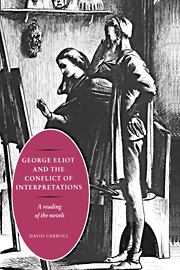Book contents
- Frontmatter
- Contents
- Preface
- Introduction: a working hypothesis
- 1 Scenes of Clerical Life: familiar types and symbols
- 2 Adam Bede: pastoral theodicies
- 3 The Mill on the Floss: growing up in St Ogg's
- 4 Silas Marner: rustic hermeneutics
- 5 Romola: duplicity, doubleness, and sacred rebellion
- 6 Felix Holt: commentaries on the apocalypse
- 7 Middlemarch: empiricist fables
- 8 Daniel Deronda: coercive types
- Conclusion
- Notes
- Index
8 - Daniel Deronda: coercive types
Published online by Cambridge University Press: 17 August 2009
- Frontmatter
- Contents
- Preface
- Introduction: a working hypothesis
- 1 Scenes of Clerical Life: familiar types and symbols
- 2 Adam Bede: pastoral theodicies
- 3 The Mill on the Floss: growing up in St Ogg's
- 4 Silas Marner: rustic hermeneutics
- 5 Romola: duplicity, doubleness, and sacred rebellion
- 6 Felix Holt: commentaries on the apocalypse
- 7 Middlemarch: empiricist fables
- 8 Daniel Deronda: coercive types
- Conclusion
- Notes
- Index
Summary
The radically new mode in which Daniel Deronda is written abandons the technique of depicting character as an embodied world-view, that painfully negotiated equilibrium between the self and the world through which both are constituted. In the unstable world of Middlemarch, which is ‘altering with the double change of self and beholder’, that negotiation becomes more and more difficult: from one point of view the characters are simply clusters of signs for their neighbours' misinterpretations, and yet they know that their own inner life is made up of what they imagine those neighbours think about them. Each of the empiricist fables of which Middlemarch is made up underlines the same point, as it deconstructs and harshly redefines the providentially based world-views with which the characters embark on their careers. At the crises of their lives they become, once again, simply clusters of signs subject to conflicting interpretations in a suspicious community.
Daniel Deronda starts from this assumption and explores its implications more radically. If the representation of the self and its interpretation form no stable relationship, what are the implications for culture and characters? George Eliot's answer is to explore the psychic roots of character anterior to the formation of a coherent view of the world, and at the same time to uncover the psychic roots of religion anterior to the formation of creeds and rituals. In what one critic has called this ‘modern reflective epic’, each entails the other in answer to the question, where does genuine coherence originate in a fragmented and materialistic culture? The answer is articulated in the conflict between two typologies, biblical and social, those two powerful interpretative modes.
- Type
- Chapter
- Information
- George Eliot and the Conflict of InterpretationsA Reading of the Novels, pp. 273 - 312Publisher: Cambridge University PressPrint publication year: 1992



